Bringing a dog into your home is a joyous occasion, but for many, the thought of constant shedding can be a major concern. Whether you live in an apartment, suffer from allergies, or simply prefer a tidy home, finding the right canine companion means looking for best small indoor dogs that don’t shed. These breeds offer the companionship and charm of a loyal pet without the endless battle against dog hair on your furniture and floors. In this comprehensive guide, we’ll explore various small breeds renowned for their minimal shedding, helping you discover the perfect furry friend that fits seamlessly into your lifestyle.
Understanding Non-Shedding and Hypoallergenic Traits
Before diving into specific breeds, it’s essential to understand what “non-shedding” truly means and how it relates to allergies. Most dogs shed to some extent, but some breeds shed significantly less due to their hair growth cycles. Dogs with hair (like humans) rather than fur tend to have continuous growth, meaning dead hairs are often caught in their coats instead of falling out. This characteristic is often linked to “hypoallergenic” qualities. While no dog is 100% hypoallergenic, these breeds produce fewer allergens (found in dander, saliva, and urine) and are generally better tolerated by individuals with sensitivities. Regular grooming is still crucial for these breeds to prevent matting and keep their skin healthy, ensuring their low-shedding benefits are fully realized. If you are specifically looking for a dog that is both small and hypoallergenic, you might find more options on our page about small hypoallergenic dog breeds that don t shed.
Key Considerations for Indoor Dogs
Choosing an indoor dog goes beyond just shedding. For a small breed to thrive in an indoor environment, especially apartments, several factors come into play:
- Exercise Needs: While all dogs need exercise, some small breeds are content with indoor play and short daily walks, while others require more vigorous activity.
- Noise Levels: Excessive barking can be an issue in close living quarters. Some breeds are naturally quieter than others. Our guide to small quiet dog breeds that don t shed offers excellent insights for those prioritizing peace and quiet.
- Temperament: A good indoor dog is typically adaptable, enjoys being part of family life, and can be comfortable in smaller spaces.
- Training and Socialization: Early training is crucial for any dog, but especially for those living indoors, to ensure good manners and prevent destructive behaviors.
Considering these aspects alongside shedding will help you make an informed decision for a harmonious home environment.
Affenpinscher
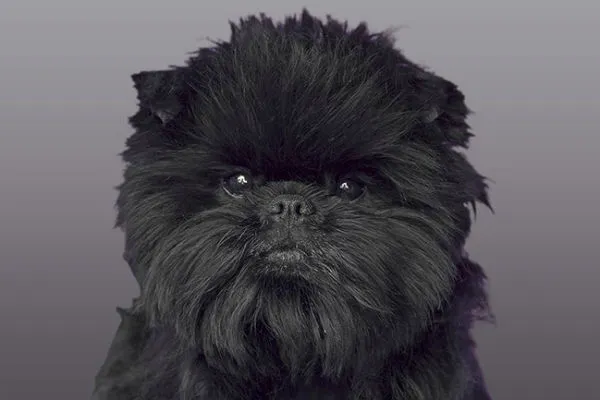 Affenpinscher dog with dark, wiry coat standing alertly
Affenpinscher dog with dark, wiry coat standing alertly
The Affenpinscher, translating to “monkey-like terrier,” perfectly lives up to its name with its intelligent expression and spirited personality. Despite their compact size, these Toy breed dogs are remarkably fearless and make excellent watchdogs, alerting you to any unexpected visitors without being overly yappy. One of their most appealing traits for indoor living is their wiry coat, which sheds very little and has almost no “doggy odor.” This makes them a fantastic choice for those seeking a clean home. Maintaining their shaggy yet neat appearance is simple, requiring just a twice-weekly brushing with a slicker brush and comb. Their low-maintenance grooming, combined with a famously humorous disposition, makes the Affenpinscher a delightful and tidy indoor companion.
Basenji
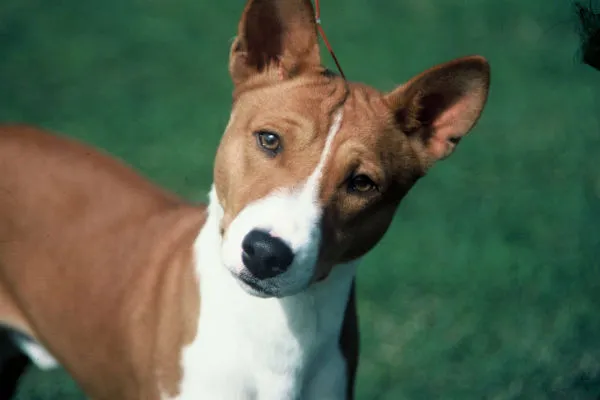 Basenji dog with short, fine coat in red and white markings
Basenji dog with short, fine coat in red and white markings
For enthusiasts of hound breeds who are less fond of their typical shedding and distinct scent, the Basenji offers an intriguing alternative. Often called the “barkless dog,” Basenjis are famously quiet, communicating through yodels and howls rather than barks. This trait, coupled with their minimal shedding, makes them an exceptional choice for apartment living. Their short, fine coats require very little care beyond an occasional brushing to keep them looking pristine. While their grooming needs are minimal, Basenjis are energetic and intelligent, needing daily exercise and mental stimulation to thrive. Providing regular playtime and walks ensures these elegant and clean dogs remain well-behaved and happy in an indoor setting.
Bichon Frise
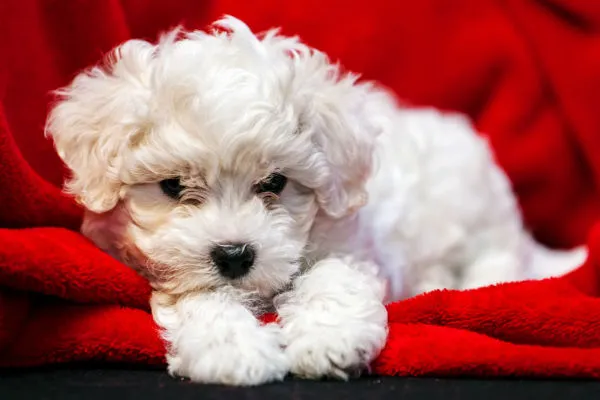 Fluffy white Bichon Frise dog sitting cheerfully
Fluffy white Bichon Frise dog sitting cheerfully
The Bichon Frise is truly the epitome of a non-shedding small dog breed, making them an ideal choice for people with allergies. These playful, affectionate, and charming dogs are known for their distinctive powder-puff appearance. However, their beautiful, continuously growing hair, similar to human hair, means they are not maintenance-free. To keep their signature look and prevent matting, Bichon Frise dogs require frequent grooming, daily brushing, and regular baths. This dedication to grooming ensures they remain fluffy and clean, without leaving trails of hair around your home. Their cheerful disposition and moderate exercise needs make them wonderful, low-shedding indoor companions.
Bolognese
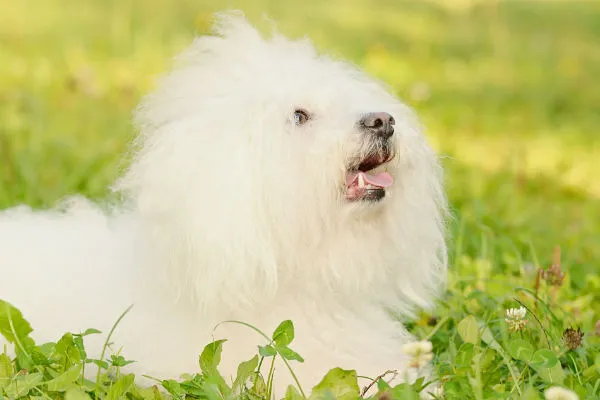 White fluffy Bolognese dog with a sweet expression
White fluffy Bolognese dog with a sweet expression
Much like their cousin, the Bichon Frise, the Bolognese boasts a distinctive fluffy coat composed of hair rather than fur, signifying its non-shedding nature. This breed is an excellent option for those prioritizing a hair-free home and those with allergies. While they don’t shed, their unique coat does require diligent daily grooming to remove dead hair and prevent mats. Regular brushing ensures these lovable lap dogs maintain their best appearance. Bolognese dogs are known for their calm, devoted, and somewhat reserved temperament, making them perfectly suited for indoor living. Their affectionate nature means they thrive on human companionship and are happy to be by their owner’s side, whether in a large house or a cozy apartment.
Brussels Griffon
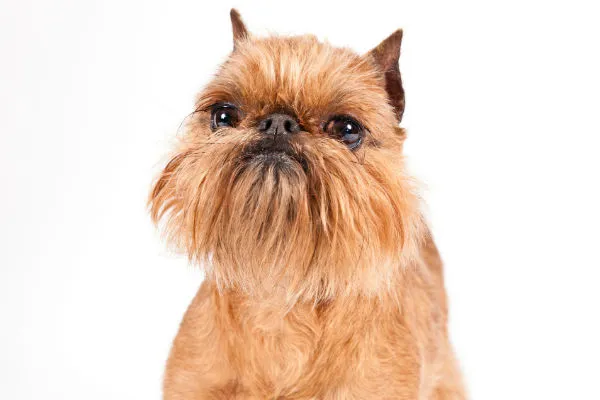 Brussels Griffon dog with a wire-haired reddish-brown coat looking curious
Brussels Griffon dog with a wire-haired reddish-brown coat looking curious
Despite their small stature, Brussels Griffons are sturdy dogs that don’t demand excessive pampering, making them a practical choice for indoor living. They come in both smooth-coated and rough-coated varieties, both of which are minimal shedders. The rough-coated Griffons shed even less and have a wiry texture. Regular grooming, including brushing and occasional hand-stripping for the rough coats, keeps them looking their best. Their modest size means that daily walks combined with indoor play are usually sufficient to meet their exercise needs, making them suitable for apartment life. Brussels Griffons are loyal and sensitive dogs who form strong bonds with their families and prefer to have their people frequently at home, offering constant companionship without the mess of shedding.
Chinese Crested
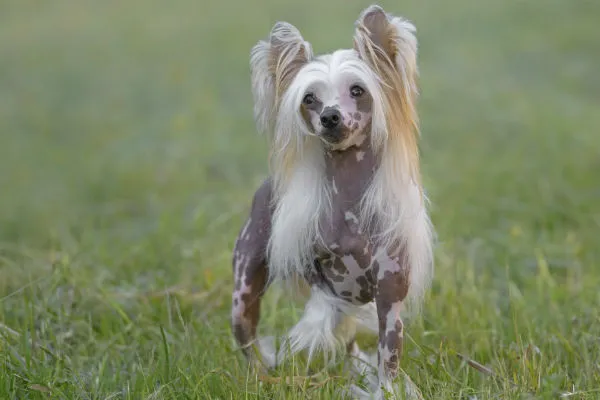 Hairless Chinese Crested dog with hair on head, tail, and paws
Hairless Chinese Crested dog with hair on head, tail, and paws
For those looking to completely avoid shedding, the Chinese Crested offers an almost hairless option. This unique breed comes in two varieties: hairless and powderpuff. The hairless Chinese Crested has tufts of hair only on its head, tail, and feet, making shedding virtually nonexistent. The powderpuff variety, on the other hand, is covered in a soft, fine coat of hair that sheds very minimally. While shedding is not a concern, the hairless variety requires special skin care, including protection from sun and cold, and regular moisturizing to prevent irritation. Both varieties are affectionate, playful, and thrive as indoor companions, enjoying cuddles and playtime with their families. Their quiet demeanor and small size make them ideal for apartment dwellers seeking a unique, low-shedding dog. For a broader perspective on similar breeds, explore our list of small dogs that don’t shed.
Coton De Tulear
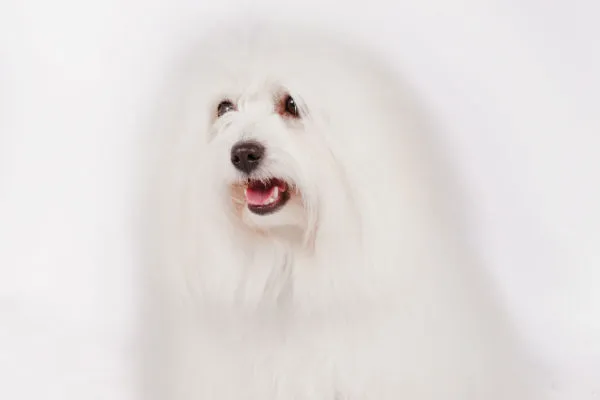 Fluffy white Coton de Tulear dog with dark eyes
Fluffy white Coton de Tulear dog with dark eyes
The Coton de Tulear, named for its cotton-like coat, features a distinctive, long, fluffy white coat that is considered hypoallergenic and sheds very little. This makes them an excellent choice for allergy sufferers and anyone desiring a small, clean, and charming indoor dog. While their non-shedding trait is a huge plus, their beautiful coat does require daily grooming to prevent matting and keep it healthy. However, the Coton de Tulear’s lighthearted, gentle, and affectionate nature makes the grooming effort well worth it. They are known for their playful antics and deep devotion to their families, adapting well to various living situations, including apartments, as long as they receive adequate attention and gentle exercise.
Havanese
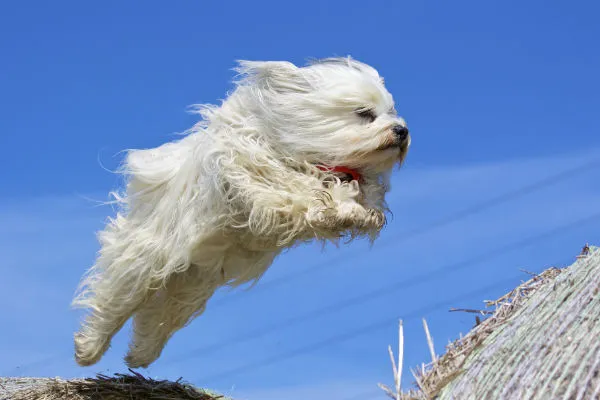 Havanese dog with long, silky brown and white fur
Havanese dog with long, silky brown and white fur
Hailing from Cuba, the Havanese charms owners with its patented spunky personality and, crucially, a coat that doesn’t shed. This means less time spent lint rolling your furniture and more quality time romping with this playful breed. The Havanese’s long, silky double coat requires weekly brushing to prevent tangles and mats, along with regular baths to keep them clean and healthy. These intelligent and outgoing dogs are excellent indoor companions, thriving on human interaction and enjoying a moderate amount of play and exercise that can often be met with indoor games and short walks. Their adaptability and affectionate nature make them a delightful addition to almost any household, providing companionship without the hassle of excessive shedding.
Maltese
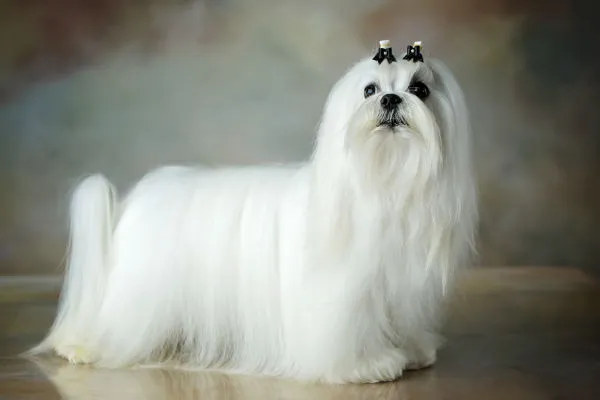 Maltese dog with long, flowing white hair sitting attentively
Maltese dog with long, flowing white hair sitting attentively
Maltese dogs have captivated humans for three millennia, with their ancient lineage tracing back to Malta. This breed has remained largely unchanged over 28 centuries, partly due to their enduring charm and their long, flowing white coats that shed very little. This minimal shedding makes them an ideal lap dog and a perfect candidate for indoor living. Their luxurious coats do require regular grooming, including daily brushing to prevent mats from forming and occasional baths to remove dirt and debris. Maltese are gentle, playful, and highly adaptable dogs who thrive on companionship and are content with indoor playtime and short strolls. Their elegant appearance combined with their sweet temperament and low-shedding qualities makes them a truly exceptional indoor pet.
Lhasa Apso
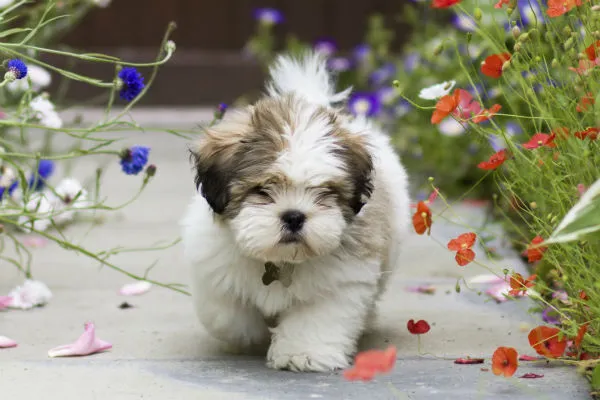 Lhasa Apso dog with long, flowing golden and white fur
Lhasa Apso dog with long, flowing golden and white fur
Originating from the snowy Himalayas of Tibet, the Lhasa Apso is a small dog breed that makes an excellent companion for indoor environments. Known for being calm yet playful, they enjoy brisk walks outdoors but are equally content resting in their owner’s lap. Lhasa Apsos are celebrated for their non-shedding coats, which were historically bred to protect them from harsh weather. However, this magnificent coat does require significant maintenance. Many owners opt to keep their Lhasa Apsos in a “puppy cut” to minimize the need for daily grooming and extensive brushing of their long hair. Their independent but affectionate nature, combined with their minimal shedding, makes them a wonderful, albeit grooming-intensive, indoor pet.
Miniature Schnauzer
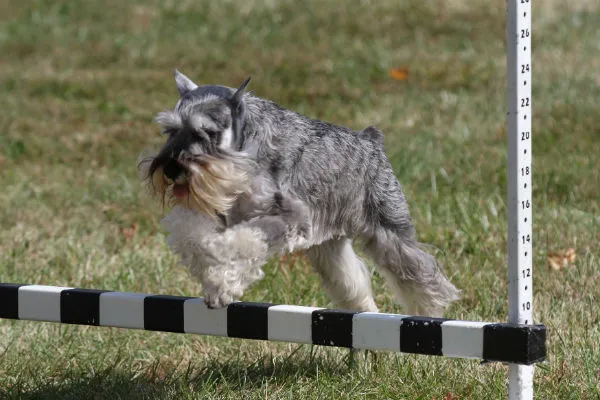 Miniature Schnauzer dog with classic salt-and-pepper wiry coat
Miniature Schnauzer dog with classic salt-and-pepper wiry coat
The Miniature Schnauzer is a smart, trainable, and cheerful little dog that strongly resembles its Standard Schnauzer cousin. This robust Terrier sheds very little, making it a fantastic choice for those seeking a clean home. Their adaptable nature allows them to feel at home whether in the bustling city or the quiet countryside, as long as their beloved people are close by. To keep Miniature Schnauzers looking their best, weekly brushing and regular professional grooming (including clipping or hand-stripping their wiry coats) are essential. They are known for their spirited personalities, intelligence, and a moderate energy level that can be satisfied with daily walks and indoor play, making them superb indoor companions. Learn more about different types of small dogs that don’t shed to broaden your options.
Poodle
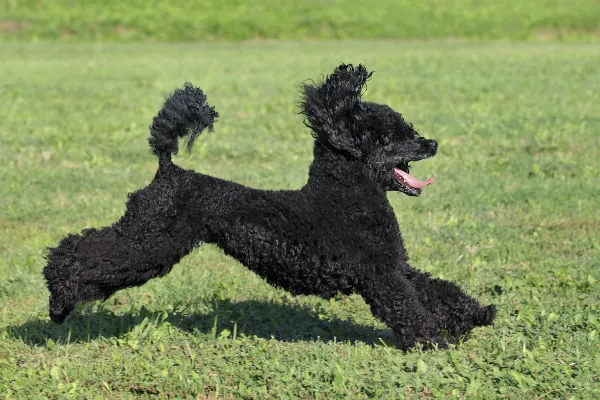 Miniature Poodle dog with fluffy white coat and happy expression
Miniature Poodle dog with fluffy white coat and happy expression
When people think of small dogs that don’t shed, Poodles often come to mind, and for good reason. Poodles, in all their sizes—Miniature and Toy Poodles for the small category—are famously non-shedding and considered hypoallergenic. These highly intelligent dogs are easily trainable, making them excellent indoor companions that quickly learn house rules. They are active and proud, requiring regular mental and physical stimulation, but their exercise needs can often be met through indoor games and walks. Their dense, curly coat, while not shedding, does require consistent regular grooming to prevent matting and maintain its healthy appearance. With their elegant demeanor and clean habits, Poodles are an enduringly popular choice for indoor living.
Scottish Terrier
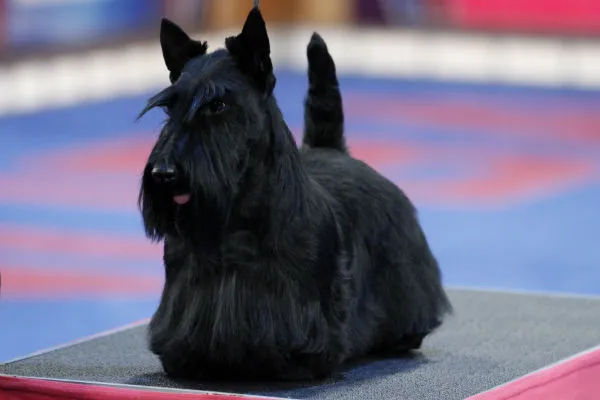 Scottish Terrier dog with black wiry coat sitting proudly
Scottish Terrier dog with black wiry coat sitting proudly
The Scottish Terrier, affectionately known as the Scottie, is a Terrier breed celebrated for its boldness, confidence, and big personality packed into a small frame. Their distinctive wiry, weather-resistant coat sheds very little, making them a favorable choice for indoor environments. While they are low-shedding, Scotties do require regular brushing, grooming, and occasional hand-stripping to maintain the health of their coat and their iconic breed outline. These clever and independent dogs possess a strong prey drive, so owners must be mindful around smaller animals. Their moderate exercise needs can be met with daily walks and play, and they adapt well to apartment living with proper stimulation, offering a loyal and spirited presence without the extensive hair clean-up.
Shih Tzu
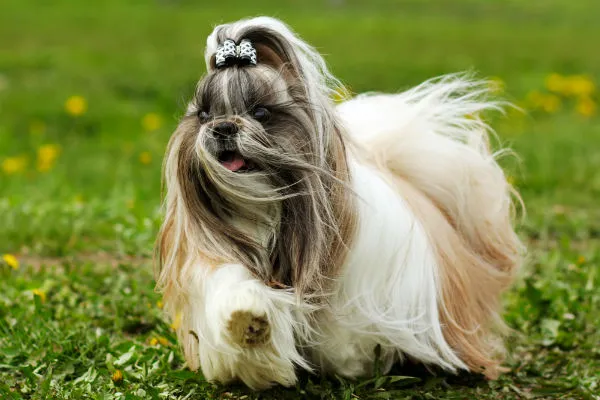 Shih Tzu dog with long, silky brown and white hair, looking regal
Shih Tzu dog with long, silky brown and white hair, looking regal
The Shih Tzu is another breed with a long and illustrious pedigree, once favored by the Tang Dynasty as “little lion dogs.” These sturdy and lively Toy breeds come in a variety of colors and patterns, all featuring long, silky hair that is exceptionally low-shedding. When properly brushed, their coats look exceptionally regal, befitting their royal ancestry. Shih Tzus were specifically bred to be house pets, and their gentle, trusting, and outgoing nature makes them exceptional indoor companions. Their moderate energy levels mean they are happy with indoor play and short daily strolls. While their beautiful coats require daily brushing to prevent mats, the minimal shedding ensures your home stays clean. Explore a broader selection of non-shedding breeds through our guide to small short haired dogs that don’t shed, though Shih Tzus are long-haired, they are worth considering for their minimal shedding.
West Highland White Terrier
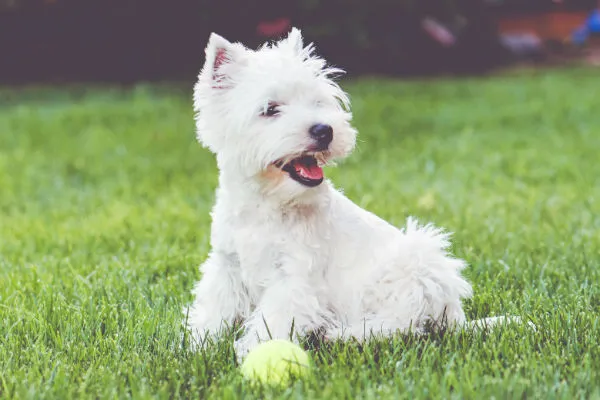 West Highland White Terrier dog with fluffy white coat, alert expression
West Highland White Terrier dog with fluffy white coat, alert expression
The coarse, bright white hair of the West Highland White Terrier, or “Westie” as they are affectionately called, sheds very little. This sturdy and intelligent little dog is known for being loyal, happy, and highly entertaining, making them a wonderful indoor companion. Westies are curious dogs with moderate energy levels, content with daily walks and playtime. They do possess an independent streak, common among Terriers, which can make training a delightful challenge at times. Their low-shedding coat requires regular brushing and occasional professional grooming or hand-stripping to maintain its health and appearance. With proper care and training, Westies seamlessly integrate into indoor family life, providing endless joy without the hassle of shedding.
Xoloitzcuintli
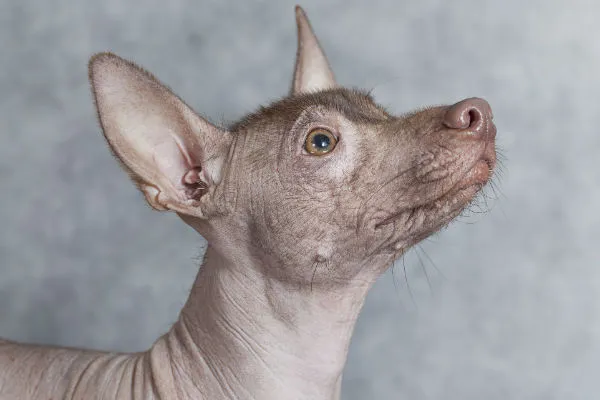 Hairless Xoloitzcuintli dog with a sleek body and alert expression
Hairless Xoloitzcuintli dog with a sleek body and alert expression
Also known as the Mexican Hairless dog, the Xoloitzcuintli is an ancient and rare breed available in hairless or coated varieties. The hairless Xolo retains only a small amount of hair on their heads, while the coated variety has a very short, fine coat that sheds minimally. This makes both types excellent choices for those seeking minimal shedding. As with any hairless breed, the hairless Xolo requires special attention to their skin, needing protection from the sun and cold, and regular moisturizing. Xolos are attentive watchdogs and affectionate companions. While they enjoy physical activities like vigorous play and walks, they are also known for their tranquil personality around the home, making them ideal indoor pets that offer a calm presence.
Yorkshire Terrier
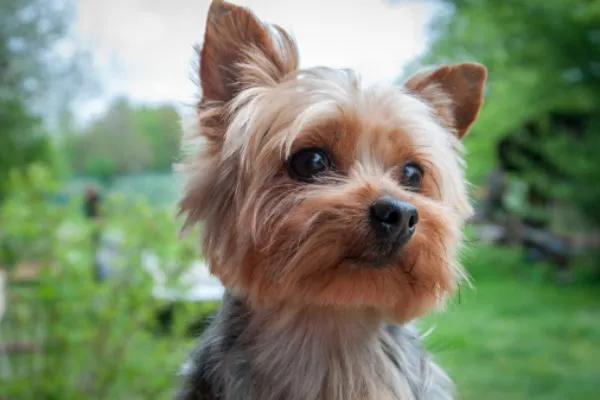 Yorkshire Terrier dog with long, silky coat and topknot
Yorkshire Terrier dog with long, silky coat and topknot
Sprightly, tomboyish, and incredibly affectionate, the Yorkshire Terrier, affectionately known as the Yorkie, is a Toy breed brimming with personality. These spunky lap dogs are among the most popular breeds, and for good reason. Yorkshire Terriers do not shed, and their long, silky coats are beautiful when brushed out daily, a task made easy by their small size. Don’t be fooled by their regal carriage – Yorkies have working-class roots, originally hunting rats in English clothing mills. Today, they are just as happy to sit on their owner’s lap as they are exploring. Their confidence, intelligence, and truly non-shedding coat make them an outstanding choice for apartment living and indoor companionship.
Other Small Low-Shedding Breeds
The Terrier group, in general, is a treasure trove of small dogs that shed minimally or not at all. Their wiry and coarse hair types are less prone to shedding than other breeds, making many Terriers ideal small dogs for people who want a clean home. Beyond the specific breeds listed above, other non- or low-shedding Terrier breeds you might consider include the Cairn Terrier, Norfolk Terrier, and Lakeland Terrier. Each of these offers a unique personality and charm while keeping the shedding to a minimum.
Choosing Your Perfect Companion
Finding the best small indoor dogs that don’t shed involves more than just their hair. It’s about matching a dog’s personality, energy level, and grooming requirements with your lifestyle. While a non-shedding coat offers significant benefits for cleanliness and allergies, remember that no dog is truly maintenance-free. Regular grooming, whether daily brushing or professional clipping, is still vital for these breeds to keep their skin and coat healthy.
Take the time to carefully research each breed, considering not just their shedding habits but also their temperament, exercise needs, and how they will fit into your daily routine. Owning a dog is a long-term commitment that brings immense joy and companionship. To ensure a healthy and happy pet, always acquire your dog from a reliable breeder or reputable rescue organization, feed them a high-quality diet, and provide regular veterinary check-ups. By choosing wisely, you can welcome a wonderful, low-shedding companion into your home that brings years of love without the mess. For more detailed insights into specific breeds and comprehensive pet care advice, explore other articles on Dog Care Story.
